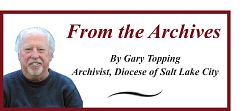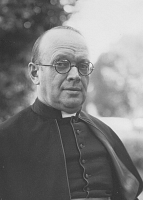Bishop Duane G. Hunt Takes on World War II
Friday, May. 13, 2016
Most historians would consider weekly parish bulletins as pretty ephemeral and of little value as historical sources. I’m finding, though, that the Cathedral of the Madeleine bulletins, carefully collected and bound into volumes by Bishops Duane G. Hunt and Joseph L. Federal from 1937 to 1980, sometimes contain significant information. Mostly this is because the Cathedral is the bishop’s church, and its bulletins contain inserts that they sent to the parishes or announcements that they intended to be read from the pulpit for the instruction of all Utah Catholics. This was particularly true as the Church attempted to cope with the dreadful crisis of World War II.
The Right Rev. Duane G. Hunt, fifth Bishop of Salt Lake, was under no illusions about the seriousness of the crisis. In his Easter 1940 message, he observed that “As Easter comes again it finds a world overwhelmed with grief and tragedies, with war and desolation. The wonderful edifice of Christian civilization, built by the Catholic Church through centuries of devotion and sacrifice, is now threatened with collapse. It is being dragged up the slopes of a new Calvary and prepared for crucifixion. What a blessing for us, therefore, to be able to lift our eyes to Easter. Always Good Friday is followed by Easter.”
After the Pearl Harbor attack of Dec. 7, 1941, with the United States finally in the war, Bishop Hunt found practical ways that Utah Catholics could contribute to the effort. One grew from the fact that many military supply depots were created in interior locations, like Utah, which would be largely immune from Japanese attack. Those depots brought many young people here from other parts of the country.
“I wonder if you appreciate,” he wrote in June 1941, “that there are several hundred Catholic boys now in our midst, brought here for training by the Army. Most of them, we can be sure, come from good Catholic homes. Many of them are away from their homes for the first time. It would seem that we have some kind of duty toward them, a Catholic duty. I suggest that you invite these boys, one or two at a time, into your homes. Give them a little companionship and perhaps some home cooked food. Inquire of your pastor; he will tell you how to send your invitation.”
Those newcomers brought with them, too, a greater social problem than simply lonely Catholic boys, for this was still a time in which segregation was a fact of life in much of the country. The Civil Rights movement was still years in the future, and even the military services were segregated until after the war was over. Bishop Hunt recognized the possibility of discrimination against African-American soldiers in Utah, where blacks were not numerous.
“The national problem has arisen concerning the Negro in this community,” he warned. “These men wearing the uniform of the Army or Navy are fighting for the defense of democracy. Their uniform alone should solicit our respect, courtesy and any kindness we may be able to show them.”
As the war reached its climax with the D-Day invasion of France on June 6, 1944, Bishop Hunt called for special prayer services in its support: “I hereby direct … that on the day of invasion, the so-called ‘D’ day, a Holy Hour be held in each church beginning at 7:30 in the evening, and this without further notice. I direct, also, that on each succeeding day, other fitting devotions be held, these to be continued until the crisis is safely passed.”
The conclusion of the war was to be similarly celebrated: “When the official announcement of V-J [Victory over Japan] Day is made the Blessed Sacrament will be exposed immediately if the announcement is made in the daytime. If not, the Exposition will take place the following day, and will conclude with a Holy Hour in the evening at 7:30.”
The Church never operates in isolation from the world, and instead must be prepared to minister to whatever circumstances it finds itself in. Few clearer examples could be found than Utah Catholicism during World War II.
For questions, comments or to report inaccuracies on the website, please CLICK HERE.
© Copyright 2024 The Diocese of Salt Lake City. All rights reserved.
© Copyright 2024 The Diocese of Salt Lake City. All rights reserved.



Stay Connected With Us